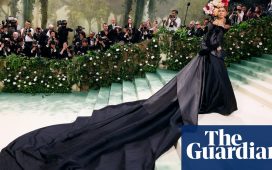It’s the run up to Christmas and Missguided’s head of buying isn’t happy. A “Satan is my sugar daddy” T-shirt sample has been produced in a lacklustre colour.
Such micro-dramas drive Inside Missguided: Made in Manchester (Channel 4), a documentary filmed in the fast fashion brand’s candyfloss-hued headquarters, a place where flamingo ornaments are omnipresent and meeting rooms are named after emojis.
So far, so reality TV. What is unexpected is the timing. A month after the horrendous revelations about a Leicester factory supplying one of Missguided’s rivals, Boohoo, made headlines, is there any joy to be found watching women wearing bejewelled headbands haggling suppliers down from £7.50 to £7.40 a unit?
The show’s propaganda-like tone doesn’t exactly read the room. The deadpan narrator is one of Missguided’s own staff, a funny touch at times (“The creative team have had three hours sleep, but no one gives a shit about that”), but one that doesn’t speak of balanced journalism.
Missguided’s world is undeniably compelling, part-Google campus, part-Barbie Dream House. Motivational quotes glare down from the walls (“We only regret the things we don’t buy!”) and everyone has tonged hair and luxuriant eyebrows. The oft-mentioned backstory is that the company lost £26m in 2018 and must push harder than ever to regain its position. Ambition radiates from the screen as the mainly female staff devote their lives – in ever more imaginative and exhausting-looking ways – to the sale of bodycon dresses.
“I like that it drains my soul,” says Treasure, the star of the show, a woman who looks like True Romance’s Alabama Whitman and sounds like Lily Savage. Treasure is reality-TV gold, her potty mouth – “We live and breathe and eat and shit Instagram and bloggers and influencers,” she says at one point, which sounds bad for the digestion – coupled with immense talent. On shoots, she arranges models’ bronzed limbs with the precision of Lucian Freud directing subjects for portraits.
There is a lot of talk of working-class people being given opportunities they would never have had in the London-centric fashion industry. Treasure, who says she grew up skint and left school at 16, is now 28 and “regularly travels the world to the sickest locations”. Victoria, from Cumbria (“Known for Cumberland sausage, but definitely not for fashion”) says that working in fashion “like John Galliano” would have been impossible for her, but Missguided made it possible. The dream Missguided is selling to customers is presented as a class issue, too; the clothes a route to self-confidence for everyday women. As Victoria puts it: “We would all love to be dripping in Gucci and Louis V, but that’s not possible.”
Female empowerment gets a lot of airtime, as the company seeks to move on from a reputation “that only hot, skinny girls wear our clothes” by filming diverse influencers talking movingly about overcoming obstacles and casting plus-size models. The company’s female-skewed workforce is presented as part of the same narrative. It sticks in the craw, though, when the narrator says that the company “may be owned by a man, but we are in charge”.
It’s clear who is boss every time the founder, Nitin Passi, a largely affable man with a chillingly well-groomed beard, walks into the room. Behold his palatial apartment in Chelsea, west London, a Chanel surfboard propped up in the hallway; observe his benediction when he suggests lending the marketing department one of his cars – a £350,000 Rolls-Royce – for a press stunt.
The programme does at least address the ethics of fast fashion, a step on from the BBC’s Breaking Fashion, which was slammed for giving the Salford label In the Style a free pass when it aired in September. In episode three, we learn that Missguided has “sharpened up our act because in the past we haven’t always got it right”, referring to a 2017 scandal in which one of its suppliers was found to be paying staff £3 an hour. “Historically,” the company’s corporate social responsibility manager says, “Missguided was the bad boy of the industry – people had a view that [we were] just trying to exploit people.” Now, we are vaguely assured, they are much more careful, as we witness a factory being audited.
Perhaps – let’s hope – this one heartening exchange is an accurate representation of the entire, sprawling, pan-global Missguided supply chain, although the show offers no evidence that would prove it. It is more caught up with what the brand represents in a conceptual way – good vibes! Empowerment! – than what it sells and how that product is made. What it sells is textiles by the truckload, and the high volume of stock combined with the obsession with rapid trends is clearly an environmental nightmare. “It’s the customer designing all of the newness, not us,” Passi says at one point. “If we don’t do it, someone else will,” he adds. The whole thing feels as much an advert for the kind of fashion industry regulation the government has always resisted as it does an advert for Missguided.














